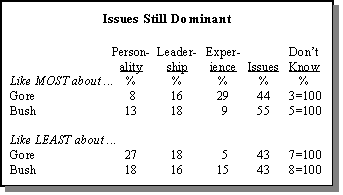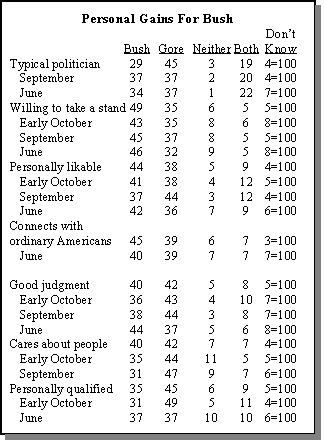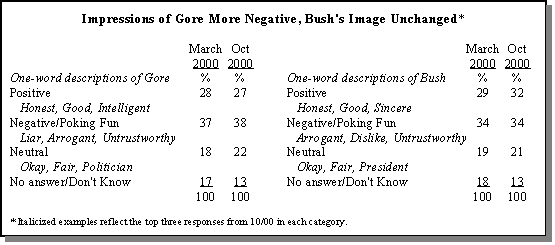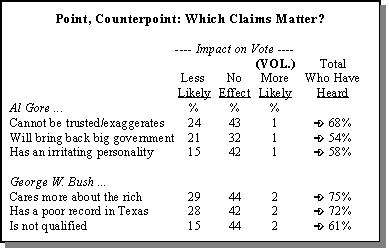Gore’s Personality Woes
While issues continue to drive most voters’ choices, personality remains an important factor in the race, particularly among Gore’s detractors. When asked what they like most about the candidates they support, a plurality of Gore voters (44%) point to his stand on the issues. A significant minority (29%) cite the vice president’s experience as his biggest draw. Another 16% choose his leadership ability; very few (8%) point to his personality. Similarly, a majority of Bush supporters (55%) say what they like best about the governor is his stand on issues. Leadership and personality are bigger pluses for Bush than for Gore: 18% and 13%, respectively, see these as Bush’s strongest selling points. Only 9% are drawn to Bush because of his experience.

Gore’s personality emerged as a real liability during the presidential debates, and those negative perceptions appear to have stuck. Fully 27% of Bush supporters now say what they like least about the vice president is his personality. This figure, virtually unchanged from early October, represents a substantial increase from September and Gore’s post-convention surge. Gore’s issue positions are also a sticking point for many Bush supporters. Fully 43% say this is what they like least about Gore. Men in particular find fault with Gore’s issue positions (49% vs. 38% of women), while women are somewhat more concerned about the vice president’s personality.
Reflecting Bush’s recent gains on personal qualities, the governor’s personality is much less of a problem for him than for Gore. Gore supporters are relatively more focused on Bush’s issue positions: 43% point to issues when asked what they like least about Bush, compared to only 18% who say personality. Sixteen percent are troubled by Bush’s leadership ability and a similar proportion (15%) are bothered by his experience.
Bush Narrows Qualifications Gap
In recent weeks, Bush has improved his standing on several important personal characteristics. Since early October, he has nearly doubled his advantage as the candidate more willing to take unpopular positions. He has virtually eliminated Gore’s lead on questions relating to judgment and compassion for ordinary people. And the Texas governor has nearly cut in half Gore’s 18-point edge on the question of which candidate is personally qualified to do the job.
At the same time, Gore’s personal image has faltered somewhat. Fully 45% of voters see him as a typical politician, compared to 37% who felt that way in September, when he held a slight lead in the presidential horse race. Just 29% n ow regard Bush as a typical politician. And while Bush’s rating for honesty has edged up slightly since September (from 35% to 38%), Gore’s has declined over the same period from 37% to 30%.

Bush has made impressive gains among key demographic groups on several of these questions. Perhaps most important, Bush has eliminated Gore’s lead among whites on the question of which candidate is personally qualified to be president. Gore held a 13-point advantage with whites (46%-33%) in early October; today the two men are in a virtual tie (Gore 40%, Bush 39%). Bush also has increased his advantage among whites — particularly white men — as the candidate viewed as more likable. Whites were divided in September (41% Bush, 39% Gore); now 50% call Bush likable, while 32% say that of Gore. Bush’s lead among white men has increased from 12 points in September (46%-34%) to 30 points today (57%-27%).
Gore’s problems can be traced partly to the doubts some Democrats harbor about the vice president’s personality and character. For instance, a sizable minority of Democrats (31%) regard Gore as a typical politician, while only 14% of Republicans associate that negative trait with Bush. On balance, independents view Gore this way (41%, compared to 29% who say Bush).
Slightly more than half of Democrats (55%) choose Gore as the honest and truthful candidate, but more than one-fifth (22%) say neither man is honest and truthful. Republicans overwhelmingly opt for Bush on this question (75% versus 5% who choose Gore), while independents are divided (32% say Bush, 29% Gore).
One silver lining for the vice president is that swing voters give him higher marks than Bush on most of these questions. Fully 46% of voters who are undecided, or still may change their vote, choose Gore as personally qualified to be president, while just 14% choose Bush. More swing voters also choose Gore over Bush as the candidate who would use good judgment in a crisis (42%-24%).
Swing voters are also far less inclined than those who have made up their minds to label Gore as a typical politician. Swing voters are divided on this question (29% view Bush as a typical politician while 32% say Gore); decided voters say that label fits the vice president (50% see him as a typical politician against 29% who choose Bush). Voters who are still up for grabs take a dim view of both candidates’ capacity for honesty — 25% say Gore, the same number opts for Bush, and 29% say neither man is honest and truthful. Decided voters favor Bush over Gore on this question, 43%-31%.
Gore Maintains Issues Edge

For all of Bush’s success on the terrain of personal traits, he has been unable to cut into Gore’s lead on major issues. As in early October, the vice president holds substantial leads on Social Security and Medicare (13 points), and making prescription drugs more affordable for seniors (17 points).
The vice president continues to be seen as the candidate best able to keep the economy strong (by 49%-37%), as well as best able to handle a significant economic downturn (44%-35%). Bush holds a slight advantage on the question of reducing political partisanship — an issue he has stressed — by 39%-32%. But on two of his signature issues — taxes and defense — he has not been able to establish a clear advantage over Gore. Slightly more voters choose Gore as Bush as the candidate who reflects their position on the role of government, although the Texas governor has emphasized that theme as well.
A bright spot for Bush is that he fares well among independents on some issues. Independents favor Bush by a wide margin over Gore on defense (49%-27%), taxes (45%-27%), and reducing partisan bickering (42%-17%). Independents also are split on education (42% Gore, 41% Bush). But the vice president holds a slight edge among independents on the economy, Social Security and prescription drugs.
And swing voters say Gore is best able to handle most major issues. These voters favor Gore by at least a two-to-one margin on prescription drugs (50%-18%), the economy (48%-21%), health care (47%-20%), Social Security (44%-22%) and foreign policy (45%-23%).
‘One-Worders’ of Gore Turn Harsh
Voters’ reservations about Gore’s personal character are evident in the harsh terms they use to describe the vice president. In the spring, many of the critical “one-word” characterizations of Gore that voters gave were light-hearted — poking fun at his wooden public persona. But today more voters associate Gore with patently negative character traits. The one word that most often arises now when voters are asked to give their impression of the vice president is “liar”; other negative characterizations include being arrogant and untrustworthy.

Fully 32% use such negative words to describe Gore now, compared to 23% in March. But Bush is also described negatively or made fun of by roughly one-in-three voters (34%), who use such terms as arrogant, untrustworthy, and inexperienced to describe the Texas governor.
Overall, Gore receives slightly more critical descriptions (38% of responses are negative or poking fun at the vice president) than Bush, and somewhat fewer positive descriptions (27% positive for Gore, 32% for Bush). The single term used most frequently to describe Bush is “honest”; other positive assessments laud Bush for sincerity and his leadership. Some of the vice president’s most frequently cited positive traits are his honesty, intelligence and competence.
Some Attacks on Bush Connecting
Most voters are familiar with the lines of attack the Gore and Bush campaigns are using against each other. But Gore has had somewhat more success getting across unfavorable descriptions of Bush that resonate with voters. While a plurality says negative campaign messages have not affected them, some charges have registered, particularly among some key swing groups.
Three-quarters of voters say they are aware of the claim, often made by Gore supporters, that Bush cares more about the rich than he does about other Americans; nearly three-in-ten say it makes them less likely to vote for the GOP nominee. Criticism of Bush’s record in Texas on such issues as health care and the environment has also registered with most Americans (72%), with 28% saying it decreases their chances of supporting Bush. The Texas governor has been less damaged by the charge that he is not qualified to be president. While 61% say they have heard such remarks, only 15% say it has negatively affected their vote.

Bush supporters have made the most headway with their persistent charge that Gore cannot be trusted because he exaggerates. Nearly seven-in-ten voters are aware of that criticism, and 24% say hearing it makes them less likely to vote for Gore. Other negative messages about Gore have had less of an impact: 58% of voters say they have heard criticism of Gore’s irritating personality, and 54% are familiar with the charge that he wants to bring back the era of big government. However only 15% and 21%, respectively, say such criticisms make them any less likely to support the vice president.
Attacks on Bush’s record in Texas have been particularly effective with non-whites. The charge that Bush cares more about the rich is taken somewhat more seriously by urban residents, members of union households, and minorities. By contrast, men — particularly older men — respond more than women to the criticisms that Gore cannot be trusted and wants to bring back the era of big government. Similarly, the claim that he cannot be trusted resonates with married and better educated voters, as do concerns about big government. However, few voters in any category put much weight on descriptions of Gore’s personality as irritating.
USS Cole Tops News Interest Index
Violent images coming from the Middle East raised the public’s interest in the news this month. Fully 44% say they paid very close attention to the deadly bombing of the Navy warship USS Cole, and nearly eight-in-ten (79%) say they followed the story at least fairly closely. That is comparable to the level of interest to past incidents of violence against Americans in the region, including the murder of a U.S. Marine in Lebanon in 1989 (49% tracked that story very closely).
More Americans also were drawn to the ongoing violence between Israelis and Palestinians. Over two-thirds (68%) say they paid at least fairly close attention to this story, up from 51% earlier this month. Fully three-in-ten Americans paid very close attention to this story, which is much higher than the news audience for past rounds of Middle East violence in 1997 and 1988.
Attention toward the presidential election rated just behind interest in the attack on Cole and ahead of the Israeli-Palestinian bloodshed. Four-in-ten Americans followed campaign news very closely, while another 37% followed it fairly closely. That is about the same as early October, when 42% followed election news very closely and 36% fairly closely.
One-in five Americans paid very close attention to recent instability in the stock market. Interest in the market’s fluctuations has remained at approximately that level all year. Men tracked the shifts in the stock market more closely than women (24% vs. 16%).

